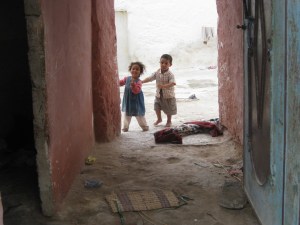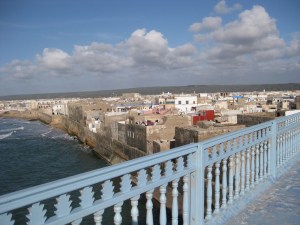This might be my favorite place in the entire world. Today’s Thursday sunset comes from Essouira, Morocco…just across the Atlantic:
Tag Archives: essouira
Morocco, Day 9 – Tigmijou
April 19 – It is a rough morning. We’re all feeling the effects of the night before, and Joya almost kills me when I open the window to light the room (to find the advil and antacids). We go upstairs to breakfast on the roof and scarf down croissants, yogurt, crepes and assorted pastries. Joya and Kate want to order five more rounds of coffee, but I need air. I go to stand at the railing where I’m looking out at the ocean. I spend about a half hour out there, enjoying the beauty of the scenery in front of me. I can’t remember when I last felt this peaceful. I try to etch this morning into my memory so I can revisit it for years to come.
I finally pull myself away from this scene to go with Rebecca, Kate, Joya and the boys to the souk to buy olives, fruits and nuts to give the women of TIgmijou – they want to serve us food when we visit, but they don’t have the means to provide enough food to our group of 14. I buy a package of bracelets to give out to the girls and young children of this village. We spend the rest of our morning walking on the beach, looking at the camels and horses around us, taking in a view of the “castle in the sand” Jimi Hendrix supposedly wrote the song after, Joya riding a horse on the beach and some seashell collecting, we sit down to an outdoor lunch of mixed salads and tea.
The road to Tigmijou is incredibly scenic, with rolling hills and wildflowers of red, yellow and purple. The village is small, with four little clusters of houses. Tim lives in a house on a hill, a little removed from the rest of the village. We see three teenage girls giggling at us as we walk up the path to his house. We can’t go inside because it seems as though his roof has fallen over in the week he’s been gone. We walk through a meadow to get to the house of the family we’re going to visit. Along the walk, we pass a stray donkey grazing in the meadow. We enter a hut, built in the same Moroccan style of homes and guest houses we’ve been seeing – a structure with an open courtyard in the middle. Upon peering into the home, we see two young children – a boy and a girl, giggling and laughing and running up to us, then bashfully running away when we wave and smile at them. We enter into the courtyard and introduce ourselves to the women, kissing them twice on each cheek. We peer into one dark room where a woman is sitting at her loom, already strung. She is rapidly weaving the water reeds through the loom. Hicham, Tim’s young artisan who we met at the craft fair, says hello to all of us and Tim explains that all these people are part of Hicham’s family. We peer into their bedroom, with no door and rugs laid out for them to sleep on. The next room is the storage room, filled with these magnificent, completed water reed bags. We sell them back in the U.S. as market bags. My mother will purchase four of these bags from Nest’s website after hearing this story.
We enter another room off the courtyard, removing our shoes first. We sit around a bench with cushions and the women bring us the olives and fruits we purchased in Essouria. They also bring us bread and olive oil. I’m on the far side of the room – most of the women are sitting at the other end of the room near Tim and Brian, the only Arabic speaking people in the group. One of the family members comes over and sits near me. She starts breaking the bread and motioning for me to eat. I take a bite and say “beneen,” one of the two Arabic words I’ve learned – meaning delicious. The little toddler girl walks into the room and bursts into giggles. Everyone is laughing and smiling at her. The woman next to me is also laughing, and we exchange a glance, which sends us into a whole new fit of laughter. She tells me to eat more and I obey. I point to a water reed bag sitting next to her and ask if she made it (using hand motions). She nods and smiles. A child’s laughter, food, art, these are all universally appreciated. I couldn’t verbally communicate with this woman, but we were able to carry out an entire conversation while eating in her home.
Tim goes around and tells us about each of the women, how they are all related, and explains that they have a wedding to go to that evening because one of the girls from their town is marrying a man from the next village. When we’re done, we all walk out of the room, slip back into our shoes, and the women lead us to another house with a loom in it. I give out bracelets as we pass little girls and teenagers on our walk through another field of wildflowers. We take a quick look at the loom, but our driver is getting angry that we’ve taken too long, and threatens to leave without us if we don’t get on the bus immediately. He actually begins removing our bags from the bus at one point. Moroccans make their own rules. We say goodbye to the women, apologizing for our abrupt departure, and as we pile onto the bus a group of small boys laugh and bully each other as they watch us. Again, behaviors that transcend languages and continents.
Morocco, Day 8 – Essouria
April 18th – Today we leave Marrakesh to visit Essouria in the south, a lovely beach town close to Tim’s remote village of Tigmijou. The three hour ride seems insanely short after the previous seven hour journeys up and down the mountains. We arrive in Essouria and once again are staying in a beautiful Riad. We go up to our room and look out the windows in the hall to see ocean and waves crashing on rocks and jetties stretching out from the coast here on the other side of the Atlantic. We go up to the roof and find an even more amazing view – looking out to the ocean on three sides, with the colorful rooftops of the city behind us.
We go out into the town and sit down at a seafood stand on the water. This stand has a display of raw fish, which I can’t stand the smell of. I’m slightly hesitant to eat here. I sit down with the rest of the group and soon find myself digging meat out of odd looking types of shellfish, some unidentifiable, but all delicious. We eat grilled calamari and sea bass fresh from the ocean next to us. I even muster up the courage to try sea urchin. After lunch, we walk around the town and pop into the small shops we see. Rebecca is having a tough time bargaining over a lantern she really wants. We stop at a rooftop wine bar to enjoy the sunset. We spot Tim and Brian sitting on the sea wall, enjoying the same view. A group of Irish people next to our table ask if we’re also stuck in Essouria because of the airport situation in Europe. We comment that it wouldn’t be tragic to find ourselves stuck here for a few extra days.
After dinner, we go back to the hotel with several bottles of wine and head up to the roof. The stars and the ocean provide an incredible setting for this late night gathering. Kate, Joya, Rebecca and I lay out on lawn chairs. We light candles so there’s a bit more illumination than just the stars. At one point, Rebecca pulls me aside and says how appreciative she is of all the work I do for Nest year round. I get a little teary eyed as she talks. It sounds stupid, but I never truly took the time to think about how what we do affects the people we’ve met here. As we go through the process of planning an event back in the U.S., I’m not thinking as I try to secure food sponsors about the woman who will send her child to school because of that event. I never stop to think about the effect one person can have, and the effect I’ve personally had over the years. I guess I should’ve realized this two years ago, when Rebecca asked me to step up as president of the NYC board, but it’s not until now that I’m really seeing the big picture. I’ve always thought of Nest as my hobby, something I can feel good about doing in my spare time, and truly proud to be part of it, but it’s not often enough that I stop to think about the difference we make across the globe.
We walk back to the group and Han gives me and Rebecca a huge hug. Rebecca comments that she loves how most Nest people are huggers. I remark that I’m usually not this touchy feely with people. They laugh and I think about how emotional I’ve gotten during this trip, particularly tonight, and I assume it must be the atmosphere, the vacation, the wine, or the overall sense of connection to the women we’ve spent so much time with on this trip, both Moroccan and American.








